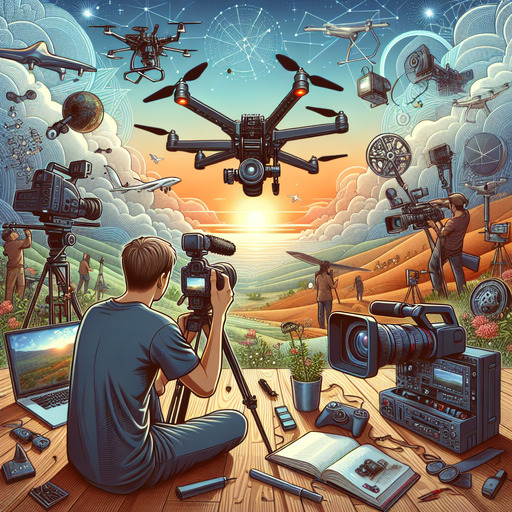
-
Table of Contents
Ready to turn your passion for videography into a thriving career? Discover essential tips, tools, and techniques to kickstart your journey in the world of professional videography. Get Started Now!
Introduction
Starting a career in videography involves a blend of technical skills, creativity, and business acumen. Begin by gaining a solid understanding of the basics of video production, including camera operation, lighting, and sound. Enroll in courses or workshops to build foundational knowledge and consider obtaining a degree in film or media studies. Invest in quality equipment, such as a good camera, microphone, and editing software, to practice and hone your skills. Build a portfolio by working on personal projects, collaborating with others, or offering your services for free or at a reduced rate to gain experience. Networking is crucial; connect with other professionals in the industry through social media, local events, and online forums. Finally, market yourself effectively by creating a professional website and utilizing social media platforms to showcase your work and attract potential clients.
How to Get Started in Videography as a Career: Essential Tips and Services for Aspiring Professionals
Embarking on a career in videography can be both exciting and daunting. The allure of capturing moments, telling stories, and creating visual art is compelling, but the path to becoming a professional videographer requires careful planning and dedication. To get started, it is essential to understand the foundational steps and services that can help you build a successful career in this dynamic field.
First and foremost, acquiring the right equipment is crucial. While it may be tempting to invest in the most expensive gear, it is more practical to start with a basic yet reliable camera and gradually upgrade as your skills and budget allow. A good quality DSLR or mirrorless camera, a sturdy tripod, and a few essential lenses can serve as a solid starting point. Additionally, investing in good audio equipment, such as a shotgun microphone and portable audio recorder, is vital since sound quality can significantly impact the overall production value of your videos.
Once you have your equipment, honing your technical skills is the next step. Understanding the fundamentals of videography, such as composition, lighting, and editing, is essential. Online courses, tutorials, and workshops can provide valuable knowledge and hands-on experience. Platforms like YouTube, Udemy, and Skillshare offer a plethora of resources that cater to various skill levels. Moreover, practicing regularly by working on personal projects or collaborating with friends can help you refine your techniques and develop a unique style.
Building a strong portfolio is another critical aspect of starting a career in videography. Your portfolio showcases your skills and creativity to potential clients and employers. Initially, you may need to take on unpaid or low-paying projects to build a diverse body of work. Focus on creating high-quality content that highlights your versatility, whether it’s short films, promotional videos, or event coverage. As you gain more experience, your portfolio will become a powerful tool in attracting more significant opportunities.
Networking is equally important in the videography industry. Connecting with other professionals, attending industry events, and joining online communities can open doors to new opportunities and collaborations. Social media platforms like LinkedIn, Instagram, and Facebook can be valuable for showcasing your work and engaging with potential clients and peers. Additionally, consider joining local videography or filmmaking groups to expand your network and gain insights from experienced professionals.
Marketing yourself effectively is essential for establishing a successful videography career. Creating a professional website that features your portfolio, services, and contact information can enhance your online presence. Search engine optimization (SEO) techniques can help your website rank higher in search results, making it easier for potential clients to find you. Furthermore, leveraging social media and content marketing strategies, such as blogging or creating behind-the-scenes videos, can help you reach a broader audience and demonstrate your expertise.
Lastly, understanding the business side of videography is crucial for long-term success. Familiarize yourself with essential business practices, such as setting competitive rates, drafting contracts, and managing finances. Offering additional services, such as video editing, color grading, or motion graphics, can also make you more marketable and increase your income potential. Continuously seeking feedback and staying updated with industry trends will help you adapt and grow in this ever-evolving field.
In conclusion, starting a career in videography requires a combination of technical skills, creativity, and business acumen. By investing in the right equipment, honing your skills, building a strong portfolio, networking, marketing yourself effectively, and understanding the business aspects, you can set a solid foundation for a successful and fulfilling career in videography.
Q&A
1. **Question:** What are the initial steps to get started in videography as a career?
**Answer:**
– **Learn the Basics:** Study the fundamentals of videography, including camera operation, lighting, and sound.
– **Get the Right Equipment:** Invest in a good quality camera, microphone, tripod, and editing software.
– **Build a Portfolio:** Create sample videos to showcase your skills. This can include personal projects, volunteer work, or collaborations.
– **Gain Experience:** Look for internships, freelance gigs, or entry-level positions to gain practical experience.
– **Network:** Connect with other professionals in the industry through social media, events, and local meetups.
– **Market Yourself:** Create a professional website and social media profiles to promote your work and attract clients.
– **Continue Learning:** Stay updated with the latest trends and technologies in videography through courses, workshops, and online tutorials.